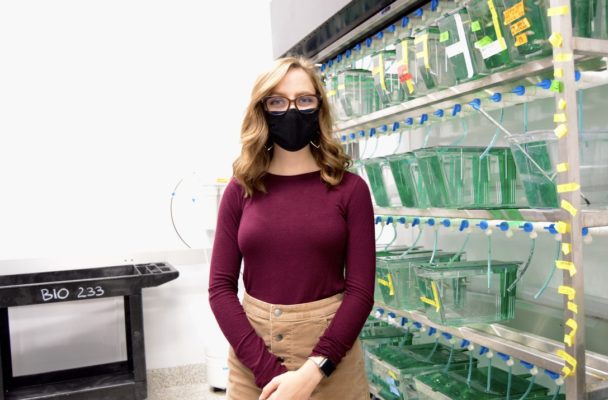Zebrafish eyes impact undergraduate research

Marlo Hemerson uses high-quality equipment to observe the different sample groups of zebrafish. Photo by Shayla Robbins
By Elise Coby
Organizations Editor
At High Point University, undergraduate research with student-faculty collaboration promotes unique and scholarly experiences for many students. These collaborations help students involved in science develop critical thinking amongst hands-on research with the assistance of faculty-influenced knowledge. The resulting experiences will benefit HPU students in potential future internships and jobs.
HPU sophomore Marlo Hemerson is involved in a student-faculty collaboration within the science department. She is currently working with the director of the Neuroscience Program, Dr. Kristin Ackerman, on zebrafish research.
“Dr. Ackerman has been an absolutely amazing role model and mentor,” Hemerson said. “She was kind enough to add me to her already-full lab and offer me a position as a freshman. I am so grateful to her for giving me such an amazing opportunity to perform research on a topic I am interested in. She shows me every day how to present myself as a powerful woman in science, and I could not ask for a better mentor.”
“I work in the neuroscience lab,” Hemerson said. “We have retinas that have been taken from zebrafish that we study under a high-powered EVOS microscope. The retinas are stained to highlight different types of cells. We focus specifically on rods, cones and progenitor cells and study how each of these cells are impacted after blinding the zebrafish for a certain amount of time: zero, 12, 24, 36 and 48 hours.”
The findings from this stage in the research indicated that the length of time fish was blinded had a substantial impact on the nuclear layers.
“We have found that the fish that have been blinded for a longer time have thinner and more damaged Outer Nuclear Layers (ONLs), a part of the retina where rods are gathered, and fewer cones because the light has destroyed them,” Hemerson said.
The main focus of Ackerman and Hemerson’s research is on the regeneration of these specific retinal cells. A unique comparison to this study is humans’ inability to perform this type of regeneration.
“Humans do not have the ability of neuronal regeneration, and we want to discover why,” Hemerson said. “After blinding these fish, the longer they live, the more progenitor cells regenerate lost neurons. So, we are able to see all the progenitor cells traveling through the retina and lining the ONLs to differentiate into either rods or cones, replenishing the lost ones. Through this, they are able to regenerate and rebuild the destroyed retinas. If we could figure out how they do this, maybe we could find a way that lets humans do the same thing.”
Hemerson stated the most interesting part of research was the surprising discovery that fish blinded for longer lengths of time don’t have more damaged receptor cells.
“We expected the fish in the longer blinding duration to have more damaged ONLs and less cone cells, but that is not what we’ve found,” Hemerson said. “In fact, it seems they have enough time to start rebuilding their ONLs and replenishing their lost cone cells.
We see that their ONLs and cone count look very similar to the control fish that have not been blinded at all. This was not a part of our hypothesis, so it’s very interesting to see how the scientific method adapts as new discoveries come to light.”
Hemerson hopes to publish her collaborative research and present it at a conference.
“I would love the chance to publish while I am at HPU, and it seems that Dr. Ackerman’s lab is on track to do that,” Hermerson said. “Before COVID-19, we were supposed to present at the SYNAPSE conference in Virginia. Should another opportunity arise, I would be ecstatic to present all our hard work.”
Hemerson is considering furthering her education at graduate school to prepare for a potential career in studying neurogenesis and regeneration.
“I am looking at applying for an M.D./Ph.D. program where I would receive both degrees,” Hermerson said. “It would open so many doors in my future post-graduation career. I never thought I would love doing research as much as I do, so to have the chance to combine research with my love for medicine is such an exciting possibility for me.”
For further questions or information about this research, Ackerman and Hemerson can be contacted at kackerma@highpoint.edu and mhemerso@highpoint.edu, respectively.